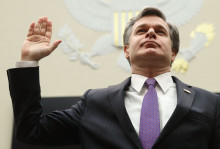Here comes the next round of encryption legislation
Another Senate bill that intends to regulate encryption in private devices is in the works.
Staffers for the Senate Judiciary Committee have been speaking with representatives of large U.S. technology companies in recent months to receive feedback for potential future legislation, three people familiar with the matter told CyberScoop. These representatives have so far included trade group associations and lobbyists for technology vendors.













































































